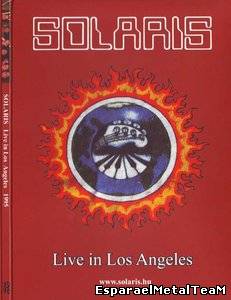Solaris - Live in Los Angeles (1995) 
DVD-5: PAL 4:3 (720x576) VBR | MPEG1, 2 ch, 224 Kbps
2010 | Solaris Music Productions | Cover Included | ~ 4.16 Gb
Progressive Rock / Symphonic Prog
Recorded at Variety Arts Center, on 11 November,1995  Solaris Biography
Solaris Biography Hungarian progressive rock band Solaris got its start in 1980. The group
was formed by Istvan Cziglan (guitar), Robert Erdesz (keys), Attila
Kollar (flute), Attila Seres (bass), and Vilmos Toth (drums). They took
their name, and the content of all their songs, from classic science
fiction. They released their self-titled debut the same year. Other
musicians who have made their way into the Solaris camp at varying times
include Csaba Bogdan (guitar), Tamas Pocs (bass), Laszlo Gomor (drums),
Gabor Kisszabo (bass), and Ferenc Raus (drums). During the course of
their career, Solaris has released a number of other albums. Those
albums are Marsbeli Kronikak -- Martian Chronicles (1984; reissued as
Martian Chronicles in Japan in 1989 and also reissued in Hungary under
the original title in 1995), Solaris 1990 (1990), Live in Los Angeles
(1996), Nostradamus (1999), and Los Angeles 2026 (2000).
by Gary Hill, allmusic 
The Hungarian formation SOLARIS was originally founded by some school
friends in 1980. The band's name was derived from the title of book by
SF writer Stanislaw Lem. After they made impression on a talent contest
at The Budai Park for a massive crowd (mainly youth) the band was
offered an opportunity to make a record. In '80 SOLARIS released their
first single entitled "Rock Hullam" (actually this was a split single,
SOLARIS got the B-side). The line-up in the early Eighties was Ferenc
Raus (drums), Gabor Kisszabop (bass), Csaba Bogdan (guitars) and the
remaining schoolfriends Istvan Cziglan (guitars), Attila Kollar (flute)
and Robert Erdesz (keyboards). They released the second single
"Eden/Counterpoint" in '81. In '84 SOLARIS released their first album
"The Martian Chronicles", it sold almost 40.000 copies. In those days
progrock was popular in Hungary: OMEGA had crowds of 100.000 spectators!
The classical SOLARIS line-up' between '83 and '85 was Attila Kollar,
Istvan Cziglan, Robert Erdesz and newcomers Laszlo Gomor (drums) and
Tamas Pocs (bass). In '90 the controlled Hungarian record company was
finally willing to release early SOLARIS recordings entitled 1990 (a
2-LP). Then the members of SOLARIS went their own way and joined or
founded new bands.
In 1995 SOLARIS was invited as the headliner of the Progfest Festival in
Los Angeles by Greg Walker, mastermind behind the USA progrock
label-mailorder service Syn-Phonic. He succeeded in persuading the band
for a reunion concert (recorded on a 2-CD and partly on a video with
other progrock bands ARS NOVA and WHITE WILLOW). The band got a standing
ovation by a bunch of real "symphomaniacs"! A year later SOLARIS
performed on the Rio Art Rock Festival, organized by the Brasilian
"proghead" Leonardo Nahoum. On December 27th 1998 guitarplayer Cziglan
died of an incurable illness but he can be heard on the surprising new
SOLARIS CD entitled "Nostradamus" ('99), perhaps we will hear more from
this marvellous progrock band. The Hungarian label Periferic Records
released in 2000 "Back to the Roots - Solaris Archive 1" (a great
introduction to the band's history but with a bootleg sound) and the
solo-albums "Musical Witchcraft" by Kollar Attila (1998) and "Seven
Gates of Alhambra" by the late Istvan Cziglan (1999).
On "The Martian Chronicles" SOLARIS creates a very dynamic and
compelling progressive mix of classical and rock music. It's build upon
sensational interplay between fiery electric guitar, tasteful keyboards
and a powerful flute with lots of changing climates, surprising breaks
and bombastic outbursts. Although SOLARIS sound rather unique, elements
of JETHRO TULL (flute), MANFRED MANN'S EARTH BAND (Minimoog solos with
pitchbend) and Jean Michel JARRE (electronic intro in the first part of
the titletrack) can be traced. The 2-LP 1990 contains typical SOLARIS
songs: dynamic and propulsive with spectacular synth runs, fiery
electric gutiar and beautiful flute-play. Remarkable is the spacy
keyboard sound in some songs and the obvious classical influences. The
tracks from the mid-period (1986) sound rather accessible: a catchy and
often funny combination of classic, pop and rock. But the most
impressive composition is their magnus opus "Los Angeles 2026" (almost
24 minutes long): lots of changing climates, bombastic synthesizers,
exciting interplay, compelling crescendos and halfway a long and
alternating pianosolo. The songs on the live 2-CD "Live in Los Angeles"
sound even more powerful and exciting than on the studio-LP's and the
bonus material is great: Bonus Game (14 minutes) includes lots of solos
on guitar, drums and bass and "Beyond" (12 minutes) is a typical
exciting SOLARIS track.
"Nostradamus - Book of Prophecies" is a captivating album in the vein of
SOLARIS but with fresh ideas and a modern sound. The titletrack
contains outstanding sonic paintings: a howling electric guitar, fat
Moog Prodigy runs ("Mark Kelly meets MANFRED MANN"), native
North-American indian chants and the Aboriginal didgeridoo. The other
songs includes elaborate and dynamic compositions with many changing
climates, spectacular breaks, splendid solos and sensational interplay. A
"killer-comeback" by SOLARIS!
~ progarchives
Tracklist:
1. Martian Chronicles Part 3.
2. Hungarian Dance
3. M'Ars Poetica
4. Duo
5. Bonus Game
6. Concerto In E Minor
7. Undefeatable
8. If The Fog Clears Aways..
9. Apocalypse
10. Wizard of Oz
11. Mickey Mouse
12. Eden
13. The Viking Comes Back
14. Solaris
Plus bonus report with the band members(from 2010)
Line-up / Musicians:
- Attila Kollár / flute, Moog synthesizer
- Csaba Bogdán / guitars
- Gábor Kisszabó / bass
- Tamás Pócs / bass
- Róbert Erdész / keyboards
- István Cziglán / guitars, Moog synthesizer
- László Gömör / drums





All thanks go to asderas
Disponible sólo a los usuarios 
















